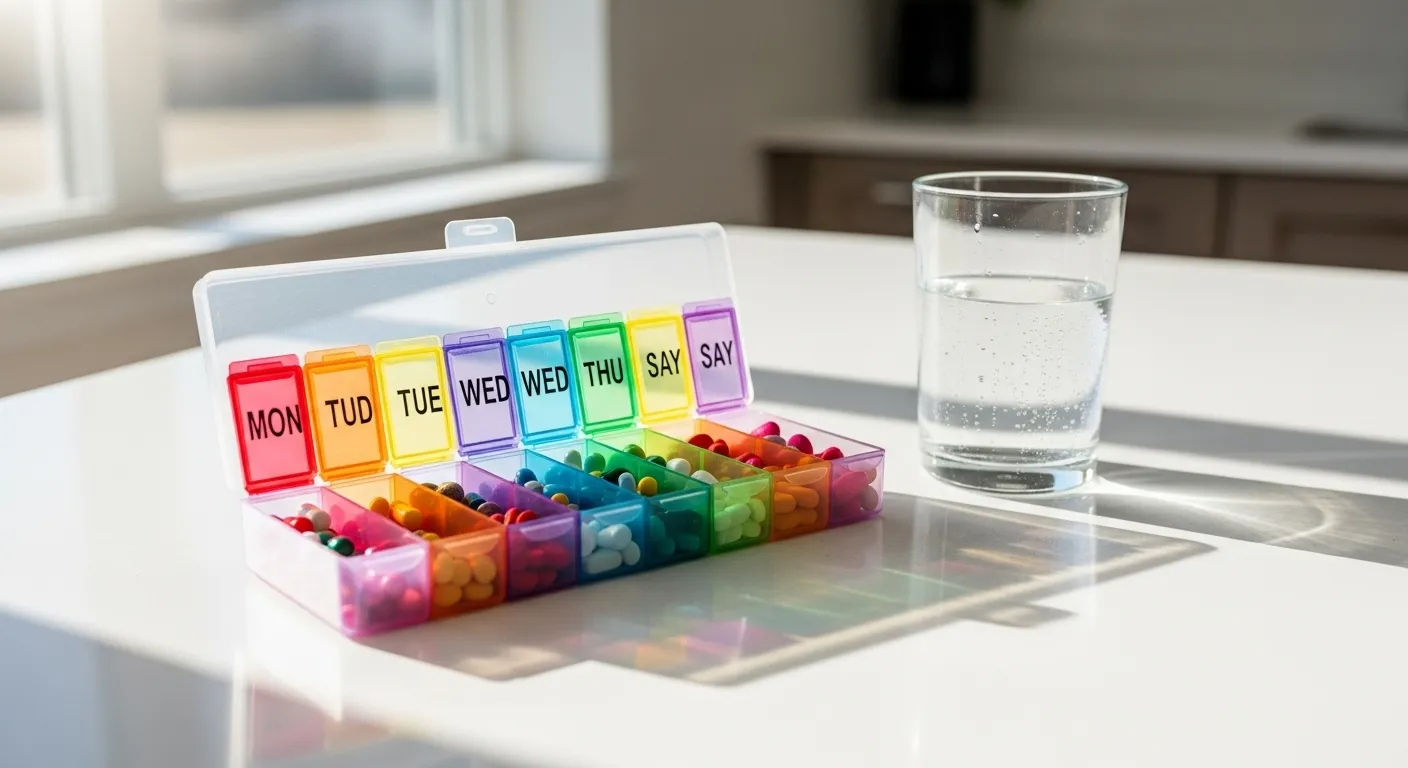
Introduction: Prioritizing Your Health with Smart Supplementation
As we navigate our golden years, maintaining health and vitality becomes a top priority. A balanced diet, regular physical activity, and staying socially engaged are the cornerstones of healthy aging. These habits help us preserve our independence and enjoy a high quality of life. However, even with the best intentions, getting all the necessary nutrients from food alone can sometimes be a challenge.
This is where dietary supplements can play a role. For many older adults, certain vitamins and minerals can help fill nutritional gaps that may develop due to changes in our bodies, diets, or lifestyles. But it’s crucial to approach supplements with caution and knowledge. The world of supplements can be confusing, with countless bottles on store shelves making bold promises.
This comprehensive supplement guide is designed to help you understand which supplements have scientific support for promoting health in seniors. Our goal is to provide clear, safe, and practical information. The most important rule is this: always speak with your doctor or a registered dietitian before starting any new supplement. They can assess your individual health needs, review your current medications for potential interactions, and recommend the right dosage, if any, for you. A “food-first” approach is always best, but when supplements are needed, they should be used wisely.
Authoritative health information for seniors is provided by the National Institute on Aging (NIA) and the Centers for Disease Control and Prevention (CDC).
Important Note for Our Readers: Your health and safety are our highest priorities. The information in this article is for educational purposes only. Please consult with your healthcare provider for personalized medical advice and before making any changes to your health regimen.

Understanding the Health Benefits (and Any Risks)
As we age, our bodies change in ways that can affect how we absorb and use nutrients. These changes are a normal part of the aging process, but they can make us more susceptible to certain deficiencies. Understanding why you might need a supplement is the first step toward making an informed decision with your healthcare team.

Why Seniors Might Need Supplements
Several factors can contribute to nutritional gaps in older adults:
- Decreased Nutrient Absorption: As we get older, our bodies may produce less stomach acid. This can make it harder to absorb key nutrients like vitamin B12 from food.
- Changes in Appetite and Diet: Some seniors experience a reduced appetite or have difficulty chewing, which can lead to eating less and missing out on essential vitamins and minerals.
- Reduced Sun Exposure: Many older adults spend more time indoors, which limits the skin’s ability to produce Vitamin D from sunlight—a critical vitamin for bone health.
- Medication Interactions: Certain prescription medications can interfere with the body’s ability to absorb or use nutrients. For example, some diuretics can deplete levels of magnesium and potassium.

The Potential Risks of Supplements
While they can be beneficial, it’s vital to be aware of the risks. Unlike prescription drugs, the U.S. Food and Drug Administration (FDA) does not regulate dietary supplements for safety and effectiveness before they are sold. This lack of oversight means you must be a careful consumer.
Potential risks include:
- Toxicity: Taking too much of a supplement can be harmful. This is especially true for fat-soluble vitamins like A, D, E, and K, which are stored in the body and can build up to toxic levels.
- Drug Interactions: This is one of the most significant dangers for seniors. For instance, Vitamin K can interfere with blood-thinning medications like warfarin. St. John’s wort, a popular herbal supplement, can interact with dozens of prescription drugs.
- Contamination: Some supplements have been found to contain unlisted ingredients, including prescription drugs, or contaminants like heavy metals.
- False Claims: Be wary of products that promise to cure diseases or offer quick fixes. If it sounds too good to be true, it probably is.
This is why a conversation with your doctor is not just a suggestion—it’s an essential safety measure. They can help you navigate these risks and ensure that any supplement you take is helping, not hurting, your health.
Important Note for Our Readers: Your health and safety are our highest priorities. The information in this article is for educational purposes only. Please consult with your healthcare provider for personalized medical advice and before making any changes to your health regimen.

Key Supplements for Seniors: A Science-Based Guide
Here, we explore some of the most studied and commonly recommended supplements for older adults. Remember, this information is meant to prepare you for a conversation with your doctor, not to replace it.

1. Vitamin D: The “Sunshine Vitamin”
Why it matters: Vitamin D is crucial for helping your body absorb calcium, making it a cornerstone of bone health and fracture prevention. It also plays a key role in immune function and muscle strength. As we age, our skin becomes less efficient at producing Vitamin D from sunlight, and kidney function may decline, which affects the body’s ability to convert it to its active form.
Food sources: Fatty fish (like salmon and mackerel), fortified milk and cereals, egg yolks, and beef liver.
When a supplement may be needed: The National Institutes of Health recommends 600 IU (International Units) for adults up to age 70 and 800 IU for adults over 70. Many doctors recommend a blood test to check your levels, especially if you have limited sun exposure or a history of bone issues like osteoporosis. Your doctor can recommend the appropriate dosage based on your results.

2. Calcium: The Bone Builder
Why it matters: Calcium is the primary mineral in your bones and teeth. Getting enough calcium throughout life helps build strong bones, and in later years, it helps slow the bone loss that can lead to osteoporosis. It works hand-in-hand with Vitamin D—without enough Vitamin D, your body can’t effectively absorb the calcium you consume.
Food sources: Dairy products (milk, yogurt, cheese), fortified orange juice, leafy greens (kale, broccoli), and canned fish with bones (sardines, salmon).
When a supplement may be needed: Recommended daily intake for women over 50 and men over 70 is 1,200 mg per day. It’s best to get calcium from food, but if your diet falls short, your doctor might suggest a supplement. They will likely recommend taking it in smaller doses (e.g., 500-600 mg at a time) as the body absorbs it better that way. Be sure to discuss the right amount, as some studies have suggested potential links between high-dose calcium supplements and heart issues.

3. Vitamin B12: For Nerve and Blood Health
Why it matters: Vitamin B12 is essential for creating red blood cells and maintaining healthy nerve function. A deficiency can lead to anemia, weakness, fatigue, and even neurological problems like memory issues or tingling in the hands and feet. Up to 30% of adults over 50 may have difficulty absorbing B12 from food because of reduced stomach acid.
Food sources: Vitamin B12 is found almost exclusively in animal products like meat, fish, poultry, eggs, and dairy.
When a supplement may be needed: Because of absorption issues, doctors often recommend that seniors get their B12 from fortified foods or a supplement, as the synthetic form is more easily absorbed. If you experience symptoms like persistent fatigue, pale skin, or confusion, ask your doctor to test your B12 levels.
4. Vitamin B6: The Brain and Body Multitasker
Why it matters: This versatile vitamin is involved in over 100 enzyme reactions in the body, playing a role in immune function, brain development, and metabolism. Some research suggests it may be important for cognitive health in older adults. Deficiencies, while not extremely common, can cause confusion, depression, and a weakened immune system.
Food sources: Chickpeas, beef liver, tuna, salmon, chicken breast, and fortified cereals.
When a supplement may be needed: While most seniors get enough B6 from their diet, certain inflammatory conditions or kidney disease can increase your risk of deficiency. If your doctor identifies a deficiency, they may recommend a B-complex vitamin or a standalone B6 supplement.
5. Magnesium: The Unsung Hero
Why it matters: Magnesium is vital for hundreds of bodily processes, including muscle and nerve function, blood sugar control, and blood pressure regulation. It also contributes to bone health. Dietary surveys show that many older adults do not get enough magnesium from food alone. A deficiency can lead to muscle cramps, fatigue, and an irregular heartbeat.
Food sources: Leafy green vegetables (spinach), nuts, seeds, whole grains, and legumes (beans, lentils).
When a supplement may be needed: If your diet is low in magnesium-rich foods or if you have certain health conditions like type 2 diabetes or gastrointestinal disorders, your doctor might recommend a supplement. Be aware that high doses from supplements can cause digestive upset, so it’s important to follow your doctor’s dosage instructions carefully.
Important Note for Our Readers: Your health and safety are our highest priorities. The information in this article is for educational purposes only. Please consult with your healthcare provider for personalized medical advice and before making any changes to your health regimen.

Key Signs It’s Time to Consult a Doctor
Supplements are not a substitute for medical care. It is absolutely essential to seek professional medical advice if you experience any concerning symptoms. Do not try to self-diagnose a nutrient deficiency. Schedule an appointment with your doctor right away if you notice any of the following:
- Unexplained Fatigue or Weakness: While feeling tired can be a part of aging, persistent and overwhelming fatigue that doesn’t improve with rest could be a sign of anemia caused by B12 or iron deficiency.
- Cognitive Changes: Increased confusion, memory loss, or difficulty concentrating should always be evaluated by a doctor. These can sometimes be linked to a severe Vitamin B12 deficiency.
- Nerve-Related Symptoms: Numbness, tingling, or a “pins and needles” sensation in your hands or feet can be a sign of nerve issues, which may be related to a B12 or B6 imbalance.
- Bone Pain or Fractures: Aching bones, especially in your back or hips, or a fracture from a minor fall, could indicate underlying bone loss related to a lack of Vitamin D and calcium.
- Muscle Cramps or Spasms: Frequent and painful muscle cramps, especially in the legs, could be a sign of a magnesium or potassium imbalance.
- Any Negative Reaction: If you start a new supplement and experience digestive upset, skin rashes, headaches, or any other unusual side effect, stop taking it and call your doctor.
Your doctor can perform blood tests and a physical exam to get to the root cause of your symptoms and determine if a deficiency exists. This is the only safe way to approach supplementation for healthy aging.
Important Note for Our Readers: Your health and safety are our highest priorities. The information in this article is for educational purposes only. Please consult with your healthcare provider for personalized medical advice and before making any changes to your health regimen.

Making It a Part of Your Daily Routine
If you and your doctor decide that a supplement is right for you, incorporating it safely into your routine is key. Consistency is important for seeing benefits, and organization helps prevent mistakes like taking too much or forgetting a dose.
Tips for Safe Supplement Use:
- Use a Pill Organizer: A weekly pill organizer with compartments for each day (and even times of day) is an invaluable tool. It helps you see at a glance if you’ve taken your supplements and medications.
- Take with Food: Many supplements, especially minerals like calcium and magnesium, are better absorbed and less likely to cause an upset stomach when taken with a meal.
- Keep an Updated List: Maintain a complete list of all supplements, vitamins, and prescription and over-the-counter medications you take. Include the name, dosage, and how often you take it. Bring this list to every doctor’s appointment.
- Follow a Schedule: Try to take your supplements at the same time each day, such as with breakfast. This helps build a habit and makes it less likely you’ll forget.
- Store Properly: Keep supplements in a cool, dry place away from direct sunlight and out of reach of grandchildren. Avoid storing them in a bathroom medicine cabinet, as the humidity can degrade them.
- Don’t Double Up: If you miss a dose, don’t take two doses at once to “catch up.” Simply take the next dose at its scheduled time.
For insurance and medical coverage questions, refer to Medicare.gov. For mental health support, consult the National Institute of Mental Health (NIMH).
Disclaimer: This article is for informational purposes only and does not constitute medical advice. The content is not intended to be a substitute for professional medical advice, diagnosis, or treatment. Always seek the advice of your physician or other qualified health provider with any questions you may have regarding a medical condition.
Important Note for Our Readers: Your health and safety are our highest priorities. The information in this article is for educational purposes only. Please consult with your healthcare provider for personalized medical advice and before making any changes to your health regimen.

Frequently Asked Questions
1. Should I just take a daily multivitamin for seniors?
A multivitamin can seem like a simple solution, but it may not be the best one. These formulas often contain a wide array of vitamins and minerals, but they may not provide enough of the specific nutrients you need (like Vitamin D or B12) and may contain others you don’t need at all. A targeted approach based on bloodwork and a discussion with your doctor is often safer and more effective than a one-size-fits-all pill.
2. Are “natural” or “herbal” supplements safer than synthetic vitamins?
No, this is a common and dangerous misconception. The word “natural” does not mean “safe.” Herbal supplements can be very potent and can cause powerful effects on the body. Many can interact dangerously with prescription medications. For example, ginkgo biloba and ginseng can increase bleeding risk, a serious concern for anyone on blood thinners. Always treat herbal supplements with the same caution as any other medication and discuss them with your doctor and pharmacist.
3. How can I choose a reputable supplement brand?
Since the FDA doesn’t regulate supplements for quality, look for a seal from an independent third-party testing organization on the label. These groups verify that the product contains the ingredients listed on the label, in the correct amounts, and that it is free of harmful contaminants. Look for seals from:
- U.S. Pharmacopeia (USP)
- NSF International
- ConsumerLab.com
These seals don’t guarantee the product is safe or effective for you, but they do provide assurance of its quality and purity.
4. Does Medicare cover the cost of vitamins or supplements?
Generally, Original Medicare (Part A and Part B) does not cover the cost of over-the-counter vitamins or dietary supplements. They are considered non-prescription items. However, some Medicare Advantage (Part C) plans may offer a small allowance or benefit for over-the-counter health items, which could sometimes be used for supplements. It’s important to check the specific details of your plan to see what is covered.
|
Fact-Checked Content
Our editorial team reviews all content for accuracy and updates it regularly. Learn about our editorial process →
|


















